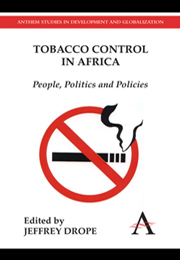Book contents
- Frontmatter
- Contents
- List of Figures and Tables
- Foreword
- Preface
- Acknowledgments
- List of Abbreviations and Acronyms
- 1 Introduction
- 2 The Political Mapping Process
- 3 Progress on Smoke-Free Policies
- 4 Taxation as a Tobacco Control Strategy
- 5 The Challenges of Implementing Bans on Advertising, Promotion and Sponsorship
- 6 The Pursuit of Packaging and Labeling Requirements
- 7 Burkina Faso
- 8 Cameroon
- 9 Eritrea
- 10 Ghana
- 11 Kenya
- 12 Malawi
- 13 Mauritius
- 14 Nigeria
- 15 Senegal
- 16 South Africa
- 17 Tanzania
- 18 Zambia
- 19 Conclusion: Tobacco Control in Africa – People, Politics and Policies
- Notes on Contributors
- Index
8 - Cameroon
Published online by Cambridge University Press: 05 March 2012
- Frontmatter
- Contents
- List of Figures and Tables
- Foreword
- Preface
- Acknowledgments
- List of Abbreviations and Acronyms
- 1 Introduction
- 2 The Political Mapping Process
- 3 Progress on Smoke-Free Policies
- 4 Taxation as a Tobacco Control Strategy
- 5 The Challenges of Implementing Bans on Advertising, Promotion and Sponsorship
- 6 The Pursuit of Packaging and Labeling Requirements
- 7 Burkina Faso
- 8 Cameroon
- 9 Eritrea
- 10 Ghana
- 11 Kenya
- 12 Malawi
- 13 Mauritius
- 14 Nigeria
- 15 Senegal
- 16 South Africa
- 17 Tanzania
- 18 Zambia
- 19 Conclusion: Tobacco Control in Africa – People, Politics and Policies
- Notes on Contributors
- Index
Summary
Executive Summary
Though the prevalence of daily smokers is comparatively low in Cameroon at 4 percent, the prevalence of occasional smokers (∼ 18 percent) and young smokers (∼ 14 percent) is higher and increasing across most social groups. There are already a number of tobacco control measures in Cameroon, including some limited smoke-free provisions, an advertising ban and some labeling requirements, but improved implementation and enforcement and a comprehensive national tobacco control bill remain central goals of the tobacco control community. Though Cameroon has ratified the Framework Convention on Tobacco Control (FCTC), none of the existing measures are FCTC-compliant.
There is evidence of support for tobacco control at the level of the president and at the ministerial level. The establishment of a Group of Experts on Tobacco Use (2007) by the national government is evidence of government interest and support. This group is charged with developing new legislation. Civil society action on tobacco control is still nascent in Cameroon.
Through 2010, the African Tobacco Situation Analysis (ATSA) team has been working to promote smoke-free policies in the Mfoundi Department (which includes Yaoundé) in the hope that this pilot phase will serve as a model that can be replicated at the national level. Major priorities for the tobacco control community include fine tuning the existing regulations, generating new and improved tobacco control legislation (either comprehensive legislation or piecemeal by area) and developing strategies to implement and enforce these new rules.
- Type
- Chapter
- Information
- Tobacco Control in AfricaPeople, Politics and Policies, pp. 107 - 122Publisher: Anthem PressPrint publication year: 2011
- 1
- Cited by



